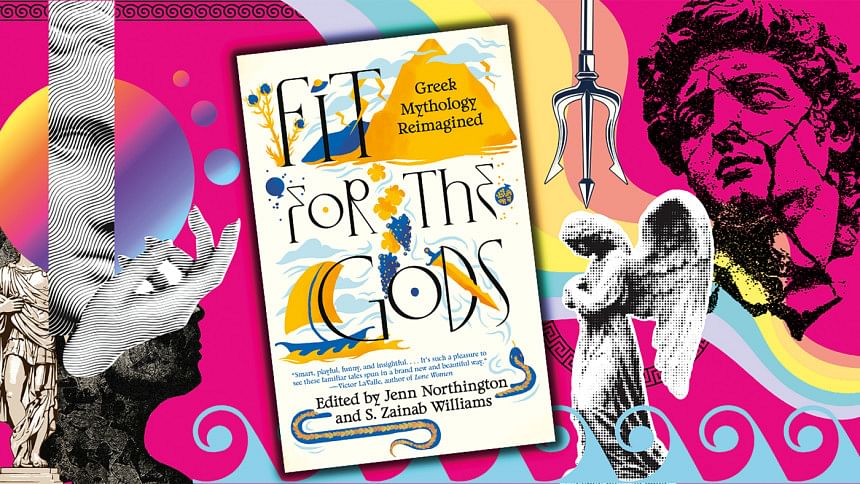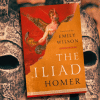A pantheon of parables

Given that the newsfeed these days reads like Yuval Noah Harari on a psychedelic trip, it's understandable that a brilliant show like Kaos (2024), with its modern depiction of the Greek mythology, complete with not-so-subtle jabs at unequal power structures, corporate greed, and inefficient bureaucracy, would not find enough viewer traction for Netflix to continue investing in it, whereas fluffy, feel-good shows like Bridgerton (2020) and Emily in Paris (2020) continue to go from strength to strength. Sometimes an escape from reality is just what the doctor ordered.
Sitting through Jeff Goldblum's delicious portrayal of megalomania, however, whetted my appetite for the Greek stories in contemporary settings, and Providence threw a neat little anthology called Fit for the Gods my way.
Taking up the challenge of shedding the light on a greater diversity of writers, this collection offers 15 imaginative gems that tell those familiar stories in entirely unexpected ways. From modern contexts to fusions with traditions from other cultures, to experiments with form, there's a little something for everyone.
"The Gorgon Confessionals" by Zoraida Córdova revisits the story of Medusa, framed as a reality podcast. Aside from the novelty of the conceit, this format also allows the writer to shift the focus of the myth from the bravery of the 'hero' Theseus who defeated the 'monster' Gorgon to the hypocrisy of the gods and goddesses that doubly victimised Medusa. S Zainab Williams herself takes a stab at the stories with "Dion and the Maenads", re-imagining Dionysus reincarnated as a woman traipsing through Napa Valley, seeking for ways to irk the gods. "Tiresias" by Zeyn Joukhadar explores some of the struggles of trans people in a modern context. "The Furies Detective Agency" by Mia P. Manansala takes the film noir approach to the story of Oedipus. "The Ship of Thea" is a gender-bent story of the Argonauts, and a story about overcoming generational trauma. Susan Purr's "Pickles for Mrs Pomme" is probably the most light-hearted story in the collection, framing Aphrodite as a lusty senior in a gated community, and a little knowledge of the pantheon and its tales goes a long way in enhancing the fun of this story.
A number of the stories fuse the Greco-Roman myths with other cultures. "Wild to Covet" by Sarah Gailey, written in the traditions of American folklore, tells the story of Thetis' journey from wild girl to wife and mother of Achilles, and is an evocative interrogation of who and what is untameable. "Words from the Mountain" by Wen Wen Yang fuses Chinese lore with Greek to make a case for breaking patterns. "No Gods, No Kings" is Maya Deane's incandescent chronicle to the role of the Amazons in the fall of the Titans. "Pescada" by Juliana Spink Mills puts Penelope, Ulysses and Circe in South America, a story about forbidden desire and repressed longings.
There are also a few exciting sci-fi entries with strong climate conscious themes, such as "Atlanta Hunts the Boar" by Valerie Valdes which is basically Fast and the Furious but with space-pod racing, and "Bastion in Spring" by Alyssia Cole, which tells the story of Persephone and Hades as a post-human story about a ravaged planet and two lonely AI's. Jude Reali's "A Heart Inured to Suffering" puts Odysseus in your classic space-age horror trope. Marika Bailey's "Trembling Aspen; Or to Shiver" is ostensibly about Apollo and Daphne, but cleverly mirrors the ecocide and terraforming perpetrated by white settlers in North America.
"The Eagles at the Edge of the World" by Taylor Rae is a standout piece of climate fiction, which chronicles the journey of the last two members of the Kumeyaay nation as they drift through the post-apocalyptic seas. The story features only passing references to "Troy", making this the most fitting story to end on.
While some stories are more memorable than others, it is worth appreciating how these retellings are so inclusive and approachable. The tweaks range from gender to race to sexuality, but each new version adds nuance, complexity, and a new perspective to the themes of the original. Familiarity with the classic myths provides readers with fun little 'aha' moments of recognition, especially at some of the witty naming conventions, but you don't have to be a mythology geek to enjoy Fit for the Gods.
Whether you're looking to see your favorite stories through a new lens or for stories that defy conventions and which create their own rules, this one's definitely worth a try.
Sabrina Fatma Ahmad is a writer, journalist, and the founder of Sehri Tales.

 For all latest news, follow The Daily Star's Google News channel.
For all latest news, follow The Daily Star's Google News channel. 











Comments